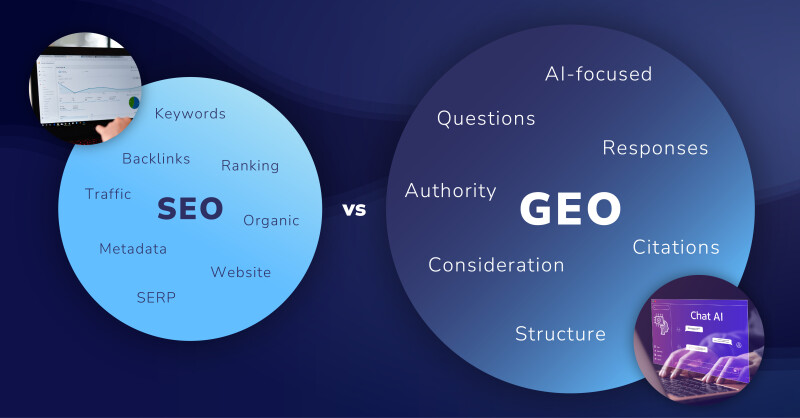As we explored in our recent article "The Last Mile Paradox," today's prospective students are no longer beginning their college search on your website. Instead, they're turning to AI platforms like ChatGPT, Google's AI Overviews, and Perplexity to create their initial consideration sets before ever visiting your carefully crafted university pages.
This shift demands a new approach beyond traditional SEO. Enter Generative Engine Optimization (GEO) – the strategy that ensures your institution remains visible and accurately represented in an AI-driven search landscape.
SEO vs. GEO: Understanding the Critical Difference
While both strategies aim to improve visibility, they target fundamentally different search environments:
Search Engine Optimization (SEO):
- Focus: Ranking high in traditional search engine results pages (SERPs)
- Strategies: Keyword optimization, backlink building, meta descriptions, site speed
- Goal: Drive organic traffic directly to your website
Generative Engine Optimization (GEO):
- Focus: Ensuring visibility and accurate representation in AI-generated responses
- Strategies: AI-friendly content structures, authoritative citations, context-rich information
- Goal: Secure your place in AI-curated consideration sets
For universities, this distinction is now mission-critical. When a student asks, "What are the best nursing programs with flexible schedules?" or "Which universities offer the strongest computer science research opportunities?" – will your institution appear in the AI's response?
Why Universities Can't Afford to Ignore GEO
The implications for enrollment marketing are profound:
- Consideration Set Formation: AI platforms are now gatekeepers to your institution, determining whether you're even considered by prospective students.
- Competitive Representation: Without GEO, competitors may receive preferential treatment in AI responses based on how effectively their content aligns with AI understanding.
- Accuracy Concerns: AI may misrepresent your programs, admissions requirements, or distinguishing features if your content isn't optimized for AI comprehension.
- First Impression Control: The initial impression of your institution is increasingly formed through AI interactions, not your marketing materials.
GEO Strategies for Higher Education
Implementing effective GEO requires specialized approaches tailored to the higher education sector:
1. Structuring Content for AI Comprehension
AI platforms need clearly structured information to generate accurate responses. This includes:
- Program Schema Markup: Implementing structured data that explicitly defines degree offerings, requirements, and outcomes
- Authoritative Citations: Ensuring your content is linked to by trustworthy academic and industry sources
- Clear Content Hierarchies: Organizing information in ways that help AI understand relationships between concepts
2. Reputation Monitoring Across AI Platforms
Understanding how AI platforms currently represent your institution is essential:
- AI Response Analysis: Systematically tracking how different AI platforms describe your programs and competitive standing
- Competitor Benchmarking: Identifying where competitors may be receiving preferential treatment in AI responses
- Misrepresentation Identification: Flagging instances where AI provides inaccurate information about your institution
3. Content Strategy Alignment
Adapting your content strategy to support both traditional SEO and emerging GEO needs:
- Question-Based Content: Creating materials that directly address the questions students are asking AI platforms
- Comparative Information: Providing clear, structured comparisons that AI can easily synthesize
- Authority Signaling: Emphasizing accreditations, rankings, and other signals that help AI identify your institution's credibility
The Everspring Advantage: Complete AI Search Strategy
At Everspring, we've built upon our understanding of the Last Mile Paradox to develop a comprehensive AI Search Strategy that includes robust GEO components tailored specifically for higher education.
Our approach helps universities:
- Assess Current AI Visibility: Understand how your institution currently appears in AI-generated responses
- Identify GEO Opportunities: Pinpoint specific improvements that can enhance your AI visibility
- Implement Strategic Solutions: Deploy targeted strategies to improve representation across AI platforms
- Monitor and Refine: Continuously track performance and adapt to evolving AI algorithms
Start with a Free AI Search Visibility Scan
Wondering how AI search engines are currently representing your university? Our team at Everspring will analyze how your institution appears in AI-generated responses and identify opportunities for improvement through our free AI Search Visibility Scan.
The Future of University Discovery is Here
As AI platforms increasingly mediate the relationship between universities and prospective students, GEO isn't just another digital marketing tactic—it's an essential component of enrollment strategy.
By implementing effective GEO alongside traditional SEO, your institution can ensure it remains visible and accurately represented where students are actually beginning their search journey.
Don't let AI determine your enrollment destiny. Take control of your institution's representation in this new search paradigm.
Connect with our team to evolve your search strategy
Everspring's Complete AI Search Strategy ensures your university shows up where students are searching—whether they're using Google or AI platforms like ChatGPT—with strategies informed by real student search behavior.

